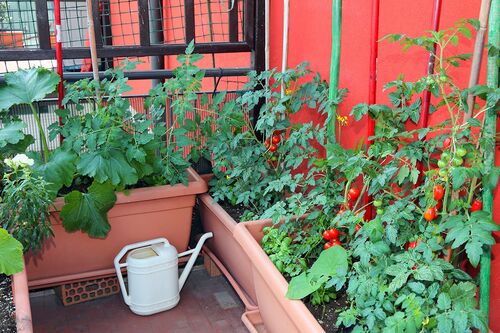Growing Vegetables and Herbs on a Balcony

You would like to grow your own vegetables and herbs, but only have access to a balcony. Is this possible?
Yes! Of course you won’t become completely self-sufficient, but still. How nice is it to harvest your own ingredients before cooking?
If you want to do this, you need to pay attention to a few things. Below we have described some important factors.
The location of the balcony
Most vegetables and herbs need a lot of sunlight. A south-facing balcony is therefore ideal. But if this is not the case, there are certainly possibilities. On a seed packet you can find a lot of information, including the recommended location, such as sunny, partial shade or shade. Of course, it is true that with a shady spot the choice is limited. But not impossible.
The size of the balcony
The bigger, the more possibilities. You'll also have space for larger containers. To enlarge the space, you could also consider vertical gardening, for example with shelves or hanging baskets. This creates more space in a limited space. Or create a living wall. And it looks great too!
If you want to grow vegetables that need more heat, you might want to consider a small greenhouse. There are small wall and balcony greenhouses for sale.
If you get very enthusiastic about this, you can of course also consider to apply for an allotment. Maybe there is an association in your area.
Pre-sowing of seeds
To be able to harvest in the summer, it is wise to pre-sow a several plants indoors. These are species that need a lot of heat and, in our climate, a longer time to grow. For example: eggplants, tomatoes, peppers and cucumbers.
You could also pre-sow other varieties, allowing you to harvest earlier in the season. Whether this is necessary, how and when is often indicated in the description on the bags. Pre-sowing is done in small pots, for example these seed trays, after which you put them in a warm, bright place. For example, the windowsill or, if the temperature allows, in a greenhouse.
As a nutrient medium you could use vermiculite. Together with the organic seed and cutting soil, it is the ideal sowing soil for your seeds! The great thing about vermiculite is that it absorbs water easily and therefore also retains nutrients well. Due to the fine structure, you can easily grow and transplant your seedlings without damaging the roots.
You can also make your own potting soil mix, mix 1 part vermiculite with 3 parts organic seed and cutting soil. This keeps your sowing soil lighter and airier, and the vermiculite also keeps the nutrients and water accessible to your plants for longer.
We sell special Spongepot seed tray with bacto and soil, which makes germinating seeds even easier! When the plants are big enough, they can be transplanted into larger pots. In order to be able to harvest regularly, you could immediately pre-sow a number of varieties.
The plant containers
There are different types of containers on the market, made from different materials and each with advantages and disadvantages.
Plastic planting pots are light, retain water well, but heat up quickly and are not very decorative. Terracotta flower pots look beautiful, are heavier and dry out faster.
Wicker containers are decorative and light, but they also dry out quickly.
To prevent drying out, you could cover the inside with plastic. Remember to have a hole at the bottom, so that the excess water can escape. Also fun, decorative and useful is to use hanging baskets. You can put several species in here. Think, for example, of cherry tomatos in combination with a red basil organic basil 'red-rubin'.
The potting soil
When growing vegetables and herbs in pots, the type of potting soil is of great importance. After all, the plant has to make do with what's in this soil. For example, use organic seed and cutting soil, so that the seeds can germinate well and the plants have a good start.
Fertilize
When growing in containers, you should fertilize the plants. How often and how much depends on the type of vegetable or herb. Some species need more nutrition than others. Always check this carefully. Nutrients can also be added in advance, for example with mycorrhizea. For more information, see how to grow vegetables and growing herbs
The type of vegetables and herbs
Choose plants that stay relatively small and also take into account how much the harvest will be. A jar full of spinach, for example, looks nice, but you need a relatively large amount for a whole meal. But, if you use it in a mix for salad, it will be sufficient. Almost all kitchen herbs can be grown in pots.
Also pay attention to the colour of the leaves and choose different colours. And of course it is possible to grow flowers on the balcony. If you opt for edible flowers, such as marigold, and cornflower, you can harvest even more from your own balcony. Nice to cheer up salads or to make a herb butter, for example.
Types of vegetables that are easy to grow in pots are for example:
lettuce, spinach, cauliflower, carrots (container must be deep enough), radish,
courgette black forest, bell pepper, pumpkins (pay attention to the size of the plant),
snack-cucumber, strawberries, beans, beetroot, pepper, eggplant and some tomatoes species (can also be grown in hanging baskets).
Also take a look at square-foot-gardening. A large number of these seeds are suitable for growing in containers. Potatoes and onions can also be grown in grow bags.
All in all, it is certainly possible to grow your own vegetables and herbs on a balcony. It is a fun activity, very decorative and above all healthy!
Enthusiastic?
Have you become enthusiastic and do you want to grow your own vegetables, herbs and flowers? And you need seeds?
Dutchgardenseeds.com has a wide range of high-quality seeds, with many organic varieties as well. Take a look at our website, with lots of information about growing your own vegetables, herbs and flowers.
Buying seeds in our webshop is definitely a good choice. We are always there for you. If you have any questions about your order, for example, you can always contact us. The great thing about growing vegetables from vegetable seeds is that the plants are often stronger and also grow without pesticides. So, it's a fun activity and a healthy one at the same time!



